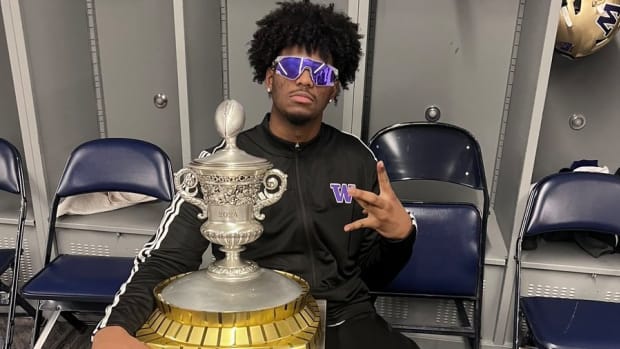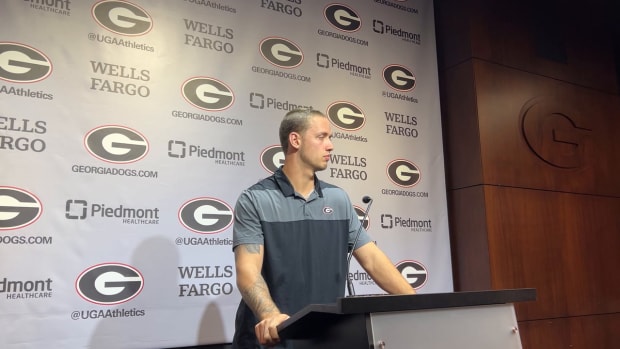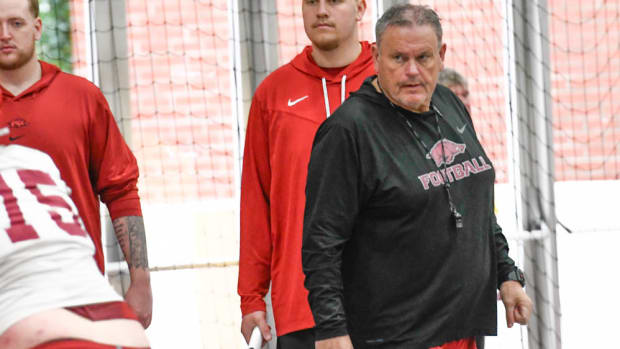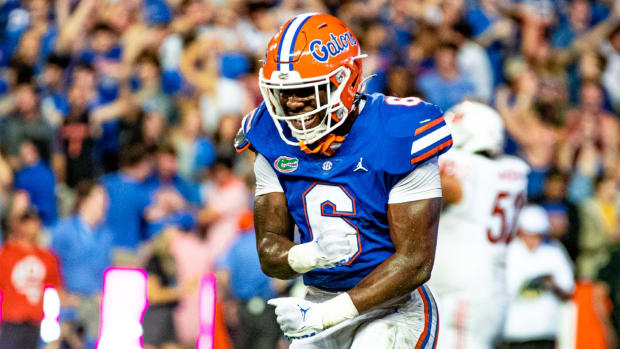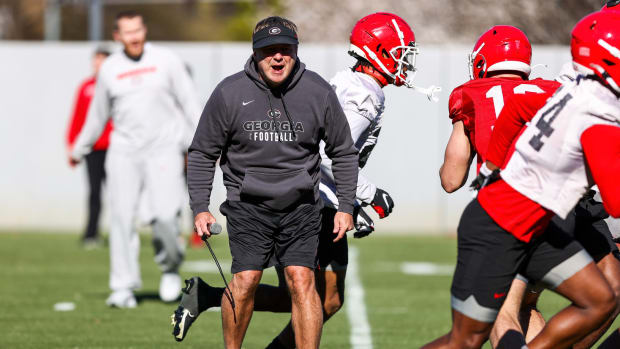
A look at complex Vanderbilt rape case that left a community reeling
After 19 months, two previous trial attempts, a trial that lasted 12 days, and just over three hours of jury deliberations, on Jan. 27 a Nashville jury convicted two former Vanderbilt football players on multiple counts of sexual battery and aggravated rape. On the surface, the case appears straightforward: four men, all of them Vanderbilt football players at the time, sexually assaulted a fellow student, and some of them took videos and photos of the incident on their cell phones. They tried to cover it up, got caught, and at least two of them will serve time for it. But the case was more complicated than it appears, and its effects are wide-ranging and far from over.
In the long lead-up to the trial, the local media speculation hit on the hot-button themes of sports, sex and campus politics. The case has tangentially involved the Tennessee legislature and the state supreme court, and the local media has sued the metro police department over failure to release information. James Franklin, Vanderbilt’s football coach at the time of the assault, has left the school and is now the head coach at Penn State, a program whose recent history includes the horrible case of Jerry Sandusky, a former Penn State assistant who was sentenced to at least 30 years in prison on 45 counts of child sexual abuse.
During the trial of the former Vanderbilt players, at least four other student-athletes testified to seeing the unconscious woman in the dorm, and two helped move her body from the hallway into the room of one of the defendants. None of them intervened or alerted authorities. Both the defense and the prosecution brought up the culture of the school, and especially of its athletes: The defense attempted to use it to excuse the defendant’s actions, while the DA portrayed them as embodiments of the problem.
It was ultimately the prosecution’s take -- along with a mountain of often graphic photo and video evidence compiled during a vigorous and comprehensive investigation by the Nashville Police Department -- that convinced the jury, but both sides made claims that are concerning to the university. Vanderbilt continues to grapple with the issue of sexual assault and the scrutiny of a federal investigation. The trial for the other two football players has yet to be scheduled, and the defense for one of the men convicted in January, Brandon Vandenburg, plans to ask for a mistrial after his lawyer discovered that a juror didn’t disclose that he was once the victim of a sex crime. Further complicating the case, a national news program, ABC's 20/20, recently showed a court-protected video of the night of the assault, airing evidence from the case when two of the men have yet to face trial, and accidentally showing the victim’s name onscreen during their East coast broadcast.
Unlike other well-known football sexual assault cases -- Steubenville (Ohio) High in 2012 or the investigation into Jameis Winston at Florida State last year -- the Vanderbilt football team is not the center of the community in Nashville, and the players involved were not particularly prominent. This incident, though, serves as an example of how sexual assault cases affect not only a team or a university, but also an entire community, with some ripples reaching far beyond the city limits.
*****
In the early morning of June 23, 2013, the Nashville deputy district attorney says then-Vanderbilt wide receiver Chris Boyd received a text message with a photo attached. It showed an unconscious 21-year-old woman being sodomized. The sender of the text was Brandon Vandenburg, a tight end who had recently transferred from the College of the Desert in California. He was, according to ESPN, “the nation’s No. 1 junior college tight end” at the time he committed to Vanderbilt, but like the other defendants, he had yet to play a down for the program. According to a statement by the deputy district attorney during a plea hearing for Boyd on Sept. 13, 2013, Boyd “promptly deleted [Vandenburg’s text] because he didn’t want his girlfriend to see it.”
The deputy DA said that Boyd texted back: “Tell ur boys to delete that [expletive]. I’m looking out for your ass.” He followed up with, “And tell your roommate he didn’t see [expletive].”
Vandenburg then called Boyd and asked him to come to his dorm in Gillette Hall. According to the DA’s statement, Vandenburg told Boyd “that the victim had been ‘messed with in the hall’ and sexually assaulted in the room, and he needed Mr. Boyd to come over.” Vandenburg was there with three other football players: Cory Batey, Brandon Banks and Jaborian McKenzie. Batey, Banks, and McKenzie were close friends. During the trial, McKenzie testified that the three of them were “like brothers ... We were best friends.”
Vandenburg had only arrived in Nashville a few weeks earlier and barely knew Batey, Banks and McKenzie. He had spotted Banks and McKenzie walking back from a middle-of-the-night food run; Batey met them just outside the dorm, and Vandenburg asked them to help him move the body of the unconscious woman to his dorm room.
Vandenburg had met up with the woman at a local bar, The Tin Roof, earlier that night. She was working that summer for Vanderbilt athletics and was about to enter her senior year. She testified that the two had seen each other three or four times in the two weeks prior to the assault. At the bar Vandenburg gave her multiple drinks, and after the fourth one, a blue drink she said he called a “California Long Island Iced Tea,” she remembers almost nothing until she woke up the next morning around 8 a.m. According to the DA’s opening statement at trial, the woman and Vandenburg first went back to her apartment, then Vandenburg drove them in her car to his dorm. With Banks’ help, he got her body into the elevator and onto the second floor. Batey and McKenzie joined them there.
In Vandenburg’s dorm room, according to the testimony of multiple witnesses and video and photographic evidence uncovered by police from the players’ cellphones and surveillance footage in the dorm, Batey raped the woman and Vandenburg, Banks, and McKenzie took pictures and video of the incident. Vandenburg tried to join in but was unable to achieve an erection, which witnesses say he blamed on being high on cocaine. Prosecutors argued that Vandenburg facilitated the assault, passing out condoms, encouraging Banks to assault her with a water bottle, and flushing the condoms down the toilet later. Because aggravated rape is a “general intent crime,” prosecutors needed to prove that Vandenburg intended to commit sexual assault and that the sexual assault occurred, but they did not need to prove that Vandenburg himself committed the act.
According to McKenzie’s testimony during the trial, Batey undressed the woman and then penetrated her with his fingers. Banks touched her and took photos of her. Vandenburg and Batey both slapped her buttocks a few times to see if she was going to wake up. Batey also urinated on her.
Vandenburg sent photos and videos of the assault to two friends in California. Later, Prosecutors say, Vandenburg flew to California and destroyed both phones. But one of the men had already downloaded the files to his computer, and Nashville police recovered them. In exchange for their testimony in court, the friends were offered a lesser charge of attempted accessory after the fact, down from felony count of tampering with evidence. One of the men took it immediately after testifying and will be on unsupervised probation for the next year. The other has yet to do the same.
According to a text Chris Boyd sent to Batey on June 24, after Boyd arrived on the scene, “Me Carta and Vanderwall [sic] and Vandenburg helped us move her out of the hallway.” While speculation arose that Boyd was referencing Austyn Carta-Samuels in that text, the deputy district attorney said Boyd was wrong and Carta-Samuels, then the starting quarterback, was not there that night, and his name did not come up at trial. “Vanderwall” referred to tight end Dillon van der Wal, who was present in the dorm, but against whom the DA chose not to press charges. Boyd did not testify at trial, but Van der Wal did. He, along with Michael Retta, a Vanderbilt tennis player, said they saw the woman lying unconscious in the hallway. DeAndre Woods, a football player who had just arrived on campus, helped Boyd move the woman’s body from the hallway into the bed. Mack Prioleau, Vandenburg’s roommate, was also there that night, asleep in his bed when the players arrived. He saw the woman on the floor, face down, and he heard the other men talking about sex and what he said sounded like porn. Prioleau later slipped out of the room and went to sleep in a friend’s room. None of these men called the police or reported what they saw to any official.
Boyd also texted his girlfriend that night to give her an update: “I got everything cleared up and I talked to both Tip [McKenzie] and Corey already. Deleted everything. She didn’t remember [expletive] and feels bad.” In the days following the assault, the DA says that Boyd “participated in a meeting with the four defendants involved in the case at a Popeye’s chicken restaurant, where the case was discussed.”
The woman woke up in a strange bed and didn’t realize where she was until she wandered into the hall. She felt “out of it, not like myself,” she testified. She was “confused, sick, nauseous,” had pain in her left shoulder and wrist, and her right knee was bleeding. She found vomit in her hair. There were bruises on her legs and her buttocks. She eventually went back to her apartment, never realizing what had happened to her.
It took two days before word of the incident made it to the Vanderbilt police department, after Vanderbilt housing staffers viewed surveillance footage from that night while investigating vandalism of the dorm. What they found -- including video of the unconscious woman being dragged around, men entering and leaving the dorm room and, at one point, Vandenburg covering the surveillance camera with a towel -- prompted them to turn the tape over to police.
James Franklin, then Vanderbilt's head football coach, testified in October at a pre-trial hearing that he was vacationing in Florida when he was told about the incident. He quickly flew back, but upon arriving in Nashville was instructed by the school’s legal staff to “stay out of it.” He held a team meeting, though, where he told the team he had seen video of the incident; he said at that same pre-trial hearing that he had lied to his players and had “spoke as if I had seen the video because I was angry and upset and didn’t want to water down the message to them.”
When the police contacted the woman on June 26, three days after the assault, she says that she at first told them what Vandenburg had told her had happened: In the afternoon on the day of the assault, she testified that “he told me that I had gotten sick in his room and he had to clean it up and that it was horrible and that he had to spend the night taking care of me and it was horrible.” In response to hearing this, she said, “I apologized. I was embarrassed.” Later when Vandenburg told her he feared that he and his teammates “might get kicked off the football team” because he was “getting blamed for stuff that didn’t happen,” she vowed to help him clear his name. The following day, though, she went for a medical exam.
By June 29 the four players had been dismissed from the team. On July 13 the athletic department barred Vanderbilt student-athletes from patronizing the Tin Roof. (David Williams, the vice chancellor for Athletics and University Affairs, later told the local media that it was not related to the June 23 incident, but rather that “he worried that student-athletes were being given free drinks -- a possible violation of NCAA rules.”)
On Aug. 9, Vandenburg, Batey, McKenzie, and Banks were all indicted on charges of aggravated rape and sexual battery. Vandenburg was charged additionally with a count of unlawful photography and tampering with evidence. A week later Boyd was suspended from the team when he was indicted as an accessory after the fact. All of the players pleaded not guilty to all charges.
In October 2013, the district attorney announced that the cases of McKenzie and Banks would be separated from Vandenburg and Batey, meaning that two joint trials would take place. While both Banks and McKenzie were expected to testify at trial, only McKenzie did. He hopes to get a plea deal.
[pagebreak]
Nashville is a rapidly growing city best known for its country music scene. The Cumberland River snakes through the city, separating the downtown state capitol from the Tennessee Titans’ field in east Nashville. Vanderbilt’s majestic Southern brick buildings sit in the southwestern corner of the city, not too far from famed Music Row. A replica of the Parthenon that was built to commemorate the centennial of Tennessee’s entry into the Union, sits proudly in Centennial Park, just across busy West End Avenue from the campus.
The university, the only private school in the SEC, is a source of pride for the city as well as a major player in the economy. Ranked among the best schools in the nation, it is also the area’s largest employer. Nearly 21,000 people work for the university and its medical center, a number that just tops the local government (including schools) as well as the state government. Compared to its SEC counterparts, Vanderbilt is an undersized school with an undersized stadium located in a large city with a professional sports culture, including the Titans and the NHL’s Predators, independent from the University.
Vanderbilt is not known as a football school. After capturing the national title this past spring, it is perhaps a baseball school. It is certainly a bowling school, the women’s team having won the national championship in 2007, the first national athletic championship in the school’s history. The women’s basketball team regularly makes the NCAA tournament. Vanderbilt football is best known as a perennial bottom feeder in the Southeastern Conference.
Braden Gall, a sportswriter who hosts a weekly radio show in Nashville about all things college football, says “You could probably argue that Alabama, Auburn, Georgia, Ole Miss have as much following in this town as Vanderbilt.”
But then James Franklin came to Nashville. From 2011 to '14, Vanderbilt turned in its best three-year run ever on the football field and the Commodores’ sustained success created an unprecedented fervor among fans on campus.
In late 2010, when Vanderbilt announced that Franklin would be its next head coach, chancellor Nick Zeppos said, “We win everywhere at Vanderbilt. We win athletically, we win academically and there is no darn reason [why] we can’t win at football.” Coming off a successful stint as an assistant head coach and offensive coordinator at the University of Maryland, Franklin had a reputation as a first-rate recruiter and had coached multiple Terrapin players into the NFL.
Former Vanderbilt players say that Franklin brought with him to the university a sense of urgency and a bottomless well of motivation. Karl Butler, a linebacker who entered the program the year before Franklin became head coach, calls him “an incredible motivator” and says playing under him was challenging because “success was really demanded and really expected.”
DeAndre Jones, a linebacker who attended Vanderbilt from 2008-12 and graduated with a degree in mechanical engineering, says Franklin “set up a model where he changed the culture, changing the mind-set of the players. He pushed us. He wanted us to think that we could always do better.” Franklin also made sure, Jones says, that “players were doing the right things on the field, off the field, holding us accountable.”
Thad McHaney, a defensive end and defensive tackle who played under Franklin and then was a student-coach alongside him, says that Franklin did a few things that had a large impact on his players. First, he made sure that players had “relationships with the staff. We all knew all of his coaches’ kids by name.” He “created a culture of fans” and, McHaney said, “push[ed] all of us, [gave] so much effort, let us know who he was, positives and negatives. It’s very hard to not play hard for a guy like that.”
In 2011, his first season as head coach, the team finished 6-6 in the regular season and played in what would be three straight bowl games. Success didn’t immediately translate into filled stadium seats. Franklin worked tirelessly to fire up the student body, spending hours high-fiving students on campus and creating the now-ubiquitous slogan “Anchor Down.” (It’s painted on the walls of the tunnel that players run through when they take the field.)
“For the first bowl game,” says Ashlyn Alongi, who was a cheerleader for the three years that Franklin was head coach, “he went around and students would call their parents to try to ask to get flights to come back for the bowl game. The students would hand Coach Franklin the phone and he would talk and plead to the families to change their flights. Silly things like that to show that he wanted you to be at the bowl, he wanted you to be in this.” She adds, “Students loved him.” DeAndre Jones puts it succinctly: “Franklin really did a good job ... making Vanderbilt [football] matter in Nashville.”
After a successful second season that saw Vanderbilt finish in the Top 25, all of the winning resulted in a sold-out opening home game in 2013 and, in November, a large new indoor practice facility. Then, in early January 2014, after just over three years in Nashville and seven months after the arrest of four of his players on sexual-assault charges, Franklin announced that he was leaving Vanderbilt to fill the vacant head coach position at Penn State.
That Penn State, a school that had become infamous for an assistant coach now in jail for sexually abusing children, would hire a coach who is connected, however tangentially, to an ongoing sexual-assault case involving multiple of his former players was baffling to some observers. Franklin told the press after his hire that it “couldn’t have been a more thorough interview process. We discussed everything.” Penn State’s athletic director at the time, Dave Joyner, said that “This whole process of vetting was maybe the most thorough vetting process of any search, perhaps of any position at this university. We utilized multiple independent third party sources. We used contacts and people that knew James closely, including officials and administrators from Vanderbilt.” In the end, Joyner said, “My belief is that James Franklin is a man of extremely high character.”
*****
During the trial, Vandenburg’s lawyers asked multiple witnesses, friends of the woman and some former players, if they knew of a “hostess” program under Franklin. While no witness admitted knowing of such a program, it was no surprise that Vandenburg’s lawyers asked about it. In November 2013, they had requested the release of text messages from coaches on the team -- though it wasn’t clear what they thought those text messages would reveal. In April 2014, a few months after Franklin had taken the Penn State job, Vandenburg’s lawyers brought their most substantial claims against him. In a court filing, they said that Franklin and former director of performance enhancement Dwight Galt (who is now at Penn State) contacted the woman in the case within days of hearing about the assault.
According to the The Tennessean, “the woman told police she was at a medical examination four days after the incident when Franklin and Galt called and told her they ‘cared about her because she assisted them with recruiting.’” According to a court filing, what she meant by “assisting them with recruiting” was that Franklin asked her “to get fifteen pretty girls together and form a team to assist with the recruiting even though he knew it was against the rules.” Vanderbilt’s vice chancellor for public affairs, Beth Fortune, wrote in a statement: “Vanderbilt University’s Athletics Department does not have a hostess program. The Athletics Department adheres to NCAA policies governing prospective student-athlete visits to campus and the Athletics Department’s own Recruiting Policy for Official and Unofficial Visits.”
Asked for comment through the Penn State Athletic Communications department, Franklin issued SI.com this statement: “The allegations that I did something wrong are simply not true. I have cooperated fully with the authorities in this matter but, out of respect for the legal process, I am not able to comment any further.”
Tom Thurman, the deputy DA in the case, told The PhiladelphiaInquirer that Franklin called the victim as a show of support, not “for any purpose of covering up or anything like that.” He also said he believed Franklin knew her because she had an association with the athletic department.
Thad McHaney says that after he first heard about the incident and the charges against his fellow players, he was shocked and disappointed. But he cautions, “I never made the correlation that just because we are doing better in football we have people that are going to do that sort of thing.” And he says that making the leap from football to sexual violence would be unjust to his former coach: “I think that’s not fair to what [Franklin’s] taught us as far as respecting women,” McHaney says.
The trial happened to coincide this year with the annual NCAA-sanctioned 48-hour recruitment visit. Batey, Banks, and McKenzie attended the same recruitment weekend in 2012 (the three were redshirted their freshmen year) and Vandenburg the one in 2013. The Tennessean reported that during last year’s recruitment visit, a 17-year-old recruit was accused of raping a Vanderbilt student. The allegations were deemed “unfounded” after a police investigation, but “heavy underage drinking was documented by police and witnesses.” None of the attention of the trial has affected the commitments from any of the recruits.
Still, the fallout for the university continues. On Oct. 4, 2013, Sarah O’Brien, a student at Vanderbilt and a former member of the Commodores women’s bowling team, wrote a piece for the Huffington Post in which she said, “Rape and sexual assault is an ongoing, systemic problem that occurs within the Vanderbilt community more often than we like to believe.”
Less than a week later the university suspended the Alpha Tau Omega fraternity for what The Tennessean described as “a rush-related email making light of an ongoing rape case,” that of the four football players. The next month, in November 2013, O’Brien was one of six women who filed a formal complaint with the Office of Civil Rights against the university, claiming the school had violated their civil rights under Title IX by failing to adequately respond to the issue of sexual assault. In April the Office of Civil Rights announced that it had launched a compliance review in response to the complaint.
Elizabeth P. Latt, assistant vice chancellor of News and Communications at Vanderbilt, says that the university is “committed to doing everything we can, and everything the law requires, to address sexual misconduct on our campus.” This includes opening “a new center dedicated to victim advocacy services, Project Safe,” promoting a bystander intervention program called Green Dots, and “publiciz[ing] information about informed consent and produc[ing] ... a series of videos created to educate students about the types of power-based personal violence as well as the relevant laws, policies, warning signs and campus resources available.” When asked specifically about what the university does to address sexual violence with its athletes, since at least nine were either perpetrators, accomplices, or witnesses that night, Latt again said “bystander intervention,” which is “stressed to our student-athletes and Athletic Department staff in team sessions, orientations, wellness programs, and workshops.” Green Dot is promoted at athletic events; the athletics department works closely with campus partners “to ensure that both student-athletes and Athletic Department staff are educated about sexual harassment, including sexual violence”; and the Athletics Department “provides ongoing leadership and personal development training for its student athletes.”
The ripples from the case go beyond Vanderbilt’s campus, spreading as far as the Tennessee legislature and the state supreme court. There is an ongoing tug of war over how much the public should be privy to about this case.
On October 16, 2013, Brian Haas, a staff writer at the time for The Tennessean, reported that earlier in the month the defendant’s attorneys agreed “to keep video and photo evidence secret” under a protective order. By the end of October, The Tennessean had formally requested through its attorney that the Nashville police release documents related to the case, saying the police denying access was possibly a violation of the Tennessee Public Records Act. The police once again denied the paper’s request in late November.
In early February of 2014 The Tennessean, as part of coalition of media and the Tennessee Coalition for Open Government that included the Associated Press, the KnoxvilleNews Sentinel, and the --Chattanooga Times Free Press, sued the city of Nashville. Within days state senator Becky Duncan Massey filed a bill in the Tennessee legislature at the request of Metro Nashville’s legal department to require “that identifying information about an alleged victim of a sexual offense, including the name, address, and telephone number of the alleged victim, be confidential.” Ostensibly, the bill serves to protect sexual-assault victims and to give them more power over when their name is released to the media. In practice, assault advocates and media personnel alike are concerned that this will make it too hard to write ethically about the crime, thus rendering sexual assault nearly invisible in media coverage.
In her Tennessean column, Gail Kerr wrote that the bill demands “all details of sexual-assault crimes would be secret unless they came out at trial” and connected the bill directly to the ongoing Vanderbilt case and her employer’s suit against the Metro government, a claim denied by the police department’s law director. The bill’s timing is suspect, insofar as it is unclear what wrong it would right; but it does help shore up the Metro PD’s position in the Vanderbilt case. Protecting the university from the scrutiny of the media is a side effect, intended or not. The bill passed and became law during last year’s legislative session.
On Sept. 30 the Tennessee Court of Appeals ruled against the media coalition, and in late November the media coalition appealed to the Supreme Court of Tennessee. On Jan. 16, the court agreed to hear the appeal, which should happen sometime this spring. The victim in the Vanderbilt case has filed an affidavit against the media coalition. Her lawyer, Ed Yarbrough, explained in June, “if we need to go a little further than we would like to restrict the Public Records Act, than we should do it. The time has come to take victim’s rights seriously and put them right up there with civil rights and all constitutional rights.”
[pagebreak]
The jury took just over three hours to find Vandenburg and Batey guilty on all counts. Their sentencing will be held in early March. The victim released a statement saying she is “hopeful that the publicity this case has received will lead to a discussion of how we can end sexual violence on college campuses.” To other victims of sexual violence she said simply, “You are not alone. You are not to blame.” She is now in graduate school and has declined to speak to the media until the entire case is finally over.
In mid-September 2013, the Nashville Post reported that Jaborian McKenzie had transferred to Alcorn State and was playing football there. Within a day of that account, he had been dismissed -- but he was allowed to rejoin the team for the 2014 season, though he did not play in a game. Last September, Brandon Banks was dismissed from Butte College after news broke that he was playing there.
Chris Boyd, the teammate who helped carry the victim to a teammate’s bed after the assault, pleaded down from a felony charge of tampering with evidence as an accessory to criminal intent to be an accessory in exchange for the promise of his cooperation for the prosecution. He was sentenced to 11 months and 29 days of probation. In November 2013 he announced that he would be entering the NFL draft and in March he got an opportunity to try for a spot on the Cowboys’ roster. He was cut in mid-August, joined the Cowboys’ practice squad and was signed to a future/reserve contract for 2015.
Even though this trial is over, another one still remains for McKenzie and Banks. And Vandenburg’s lawyer has said he will soon file a motion asking for a mistrial since one juror did not disclose that he was a victim in a sexual criminal trial years ago. The juror’s lawyer has said that case does not resemble this one in any way that would have had an impact on his client’s ability to be a fair and impartial juror.
On Jan. 30, 20/20 dedicated an hour to detailing the police investigation and the trial. The program aired the surveillance footage from Gillette Hall on the night of the rape, marking the first time the public had seen it. During the trial, all video and photographs were displayed so that only the jury, witnesses, lawyers, and judge could see them, because of the court’s protective order on the material and considering that there are more defendants to try. 20/20 also aired an image during the East coast broadcast of one of the indictments from the case file that briefly displayed the name of the victim on screen.
Julie Townsend, the senior vice president of communication for ABC News, says that the airing of the woman’s name was a “terrible mistake” that “should never have happened.” The program altered the West Coast broadcast to remove her name, had it removed from all online versions of the program, and apologized immediately to the woman through her attorney. They also launched an investigation to find out how the name made it on screen and “to make sure that never happens again.”
As for airing the video that is still under the court’s protective order, Townsend says that there were “extensive, serious conversations” about it before they aired it and that they feel they used it “extremely judiciously.” It is not clear where ABC News obtained the video, and most parties involved in the case have denied culpability. Nashville District attorney Glenn Funk issued the following statement to SI.com: “The District Attorney’s Office is outraged that this video has been leaked. It is a violation of the court’s protective order, another attack on the victim and it could impact the co-defendants’ right to a fair trial. Every member of the prosecution team is willing to testify, under oath, that the leak did not come from this office. We challenge the defense counsel to do the same. Further, the District Attorney’s Office will cooperate and assist with any investigation by the court into this serious breach.”
Worrick Robinson, Batey’s attorney, said that he and his colleague Liz Powers “are 100 percent confident that no case material from our office was given to ABC news or 20/20 ... we are happy to accept the challenge by District Attorney Glenn Funk to testify under oath regarding any question the Court may have about the video footage. I was just as surprised as others to see the video footage and tapes involved in this trial that aired on national TV.”
Fletcher Long, Vandenburg’s attorney, declined to comment.
For its part, Vanderbilt is still under a compliance review by the Office of Civil Rights for possible Title IX violations. The vice chancellor for public affairs, Beth Fortune, released a statement in which she said, “the conduct revealed by the evidence at trial was profoundly disturbing and utterly unacceptable. Our heart goes out the victim.” Zeppos, the chancellor of Vanderbilt, said in a statement that he is “deeply troubled that some students who knew or should have known about the incident that led to this week’s convictions failed to take any action. This is not the culture at Vanderbilt.”
During the trial Robinson, Batey’s lawyer, argued that Vanderbilt has a “culture of sexual freedom, of sexual experimentation. It was a culture that encouraged sexual promiscuity.” He added, “there was also a culture of alcohol and alcohol consumption.” It was this culture and his client’s extreme alcohol consumption, he argued, that was to blame for what happened that night in June. In his closing statement, Deputy District Attorney Tom Thurman countered Robinson: “The culture you really saw was entitled athletes thinking the rules don’t apply to them. Their mindset,” he argued, was “that they can get away with anything.”
Vanderbilt might not be a football school, but over the last four years, football has had a huge impact on the university. While Vanderbilt football fans and the Nashville community would happily return to worrying about woeful seasons and the yearly specter of the Tennessee-Vanderbilt showdown, the case is far from over. Even the verdict is not really a resolution -- not yet, anyway. In the aftermath of this case, questions remain about how the football team, the athletic department, the university, and the community around it will learn from this and what long-term effect, if any, it will have.




